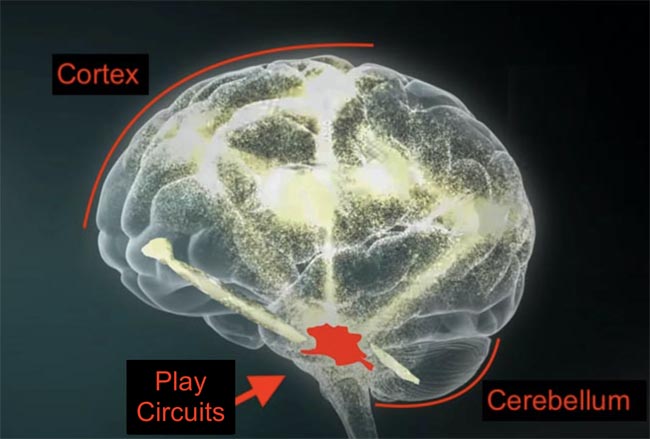Why We Play
Play Is a Biological Drive

Jaak Panksepp, a prominent neuroscientist, identified seven foundational brain circuits that are primary emotions we are born with, like fear, care, panic and play. These primal emotions are with us at birth, pre-wired in our midbrain—an ancient part of the human brain. The instinct to play is built into our biology, the play circuits in our brains. See Panksepp’s TED talk on the 7 primary emotions.
The drive to play is as fundamental as our drives for food and sleep.
We Have Play Circuits in Our Brains
Humans — and all mammals — have a biological drive to play that has evolved over millions of years. The biological elements are the play circuits buried deep in our midbrain, waiting to be activated. When the neurons of our play circuits are activated by playful elements in our environment, they motivate us to engage with those elements.
For example, when the presence of a ball, a puppy, or a fun friend activates our play circuits, we feel an urge to turn our attention to that stimulus and engage with it — toss the ball, pet the puppy or joke with the friend.


Our Play Nature Is Unique Like Our Fingerprints
Our play circuits create our “play nature” — the preferences we have for particular types of play such as movement play, object play, or social play. As we grow, those preferences expand, interact, and if not suppressed, lead to our play personality.
Each of us has an inherent play nature that is as unique as our fingerprints.
The more that very young children are able to act from their play nature, the better they will develop and reinforce the neural circuits in other parts of their brain — circuits that become the neural pathways of many life skills. The more adults act from their play nature, the greater their overall well-being. Adults who do not regularly activate their play nature may experience their lives as tinged with depression, and may lack the optimism, adaptability and resiliency to perform well in their work and family lives.




By the time children are in the classroom, they’ve been taught to suppress their natural play-based curiosity. Schools reinforce this when they eliminate recess and the arts to make more time for academics.

Dr. Brown discovered that lack of play for children increases the prevalence of:
- Depression
- Inflexibility, poor adaptability to changing conditions
- Lack of empathy
- Poor impulse control
- Addictive predilections
- Mood-driven behavior, and sometimes violence
Fortunately, the awareness that play is linked to positive academic performance is making some policy headway.
Play Drive Overcomes Predatory Instinct
Anyone who has ever tossed a frisbee with a dog recognizes that animals love to play. This story shows how powerful the play emotion is.




In short, the drive to play — to “socialize” — overcame the bear’s hunger.

What Happens When Play Is Blocked?
After discovering absence of play in the life of Charles Whitman — perpetrator of one of the deadliest mass shootings in U.S. history — Dr. Brown led teams that researched other dangerous offenders. One team researched men who were jailed for murder, and another studied men who were killed while driving drunk. In both cases, the research revealed that the subjects had experienced a lack of play in their lives.
What Does This Mean for Society?
By the time children are in the classroom, they’ve been taught to suppress their natural play-based curiosity. Schools reinforce this when they eliminate recess and the arts to make more time for academics.
Dr. Brown discovered that lack of play for children increases the prevalence of:
- Depression
- Inflexibility, poor adaptability to changing conditions
- Lack of empathy
- Poor impulse control
- Addictive predilections
- Mood-driven behavior, and sometimes violence
Fortunately, the awareness that play is linked to positive academic performance is making some policy headway.






